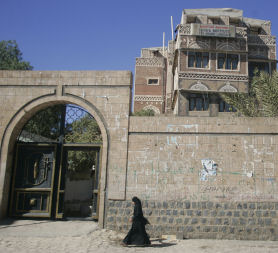Growing terrorist threat in Yemen
Updated on 06 January 2010
Jonathan Rugman visits Yemen's capital Sana'a and finds a city battling poverty, insurgency and the threat of terrorism.

On our way into Sana'a from the airport last night, my producer looked out of the window of our land cruiser and told me that, though this was her first visit, she felt she had seen Yemen all before.
She said there was a familiarity about the crumbling buildings, the chaotic line of street bazaars, the Yemenis on mopeds with their heads wrapped in scarves weaving in and out of traffic, which is so polluting in this mountainous dustbowl of a capital that your eyes water and the fumes linger uncomfortably in your throat.
“This is like Afghanistan but the roads are better and there aren’t any foreign soldiers” my producer said. A throwaway remark but one which makes a point. Because the reason that US General David Petraeus just announced a doubling of American aid here is presumably because he also fears this could be Afghanistan all over again.
Yemen: a poorly governed, tribally organised, desperately poor country, facing an insurgency in the north and a secessionist movement in the south, where al-Qaida, no stranger to Yemen anyway, can now see better openings here than elsewhere, with foreign embassies, oil terminals and one of the world’s busiest shipping lanes all within reach.
That may be the strategic picture, but the lingering memory of my first day here is the intricately beautiful buildings of the old city, and the men walking with large ceremonial daggers stuck into their belts, one of them using his as a hook for his bag of shopping.
That the al-Qaida franchise is expanding here - with Yemeni special forces reportedly attacking the militants this week after they who were believed to be attempting to bomb the US and British embassies - is surely symptomatic of al-Qaida’s weakness elsewhere.
With Osama bin Laden, himself from a Yemeni tribe, holed up somewhere on the Afghan-Pakistan border, and jihadists feeling the heat in Saudi Arabia migrating south here to Yemen across a relatively porous border during the course of last year.
But it is not just fighters in the desert waging jihad; here in Sana'a, clerics at a religious university known as al-eman are believed to have radicalised Umar Farouk Abdulmutallab, the Nigerian now accused of trying to blow up a passenger jet heading for Detroit on Christmas day.
I tried to get into the university today, on scrubland on the outskirts of the capital, but the road was barred by a checkpoint where a guard told me the institution’s founder, Sheikh Abdul Majeed Al-Zindani – designated a “terrorist” by the US – was not inside anyway.
So I went to the tiny Sana'a Institute, an Arabic language school tucked inside a pretty courtyard in the backstreets of the old city, where Abdulmutallab was enrolled as a student last August.
Inside, women clad from head to toe in black were quietly studying language textbooks, while outside in the courtyard, a cat was rolling about in the dust under the midday sun.
And there I found Ahmed Moajeb, one of Abdulmutallab’s teachers, taking a breather from his students on a garden wall.
“He was very smart, excellent at Arabic, better than all the others” Mr Moajeb told me of the would-be Detroit bomber.
“He was always smiling, his clothes were clean, he had no extremist ideas.”
“Ah, but you were wrong about that,” I told him. “Yes, I was wrong, but everybody was wrong” he replied. “The airports got it wrong. Everybody who knew about Abdulmutallab was wrong.”
Mr Moajeb is sad about what happened, sad about the stain it has inevitably left on his language institute, which struck me as a sane and civilised place of learning. We drove back to our western chain hotel, a ghastly place full of foreign press whose limited virtues include a working internet service, so I can at least send this, my first dispatch.



